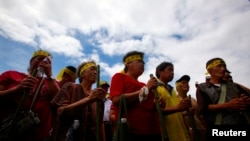TAIPEI —
Indigenous peoples’ push for legal autonomy in Taiwan reached a milestone this month when parliament changed a local governance law to give Austronesian aboriginal populations more power. The amended law removes a barricade to deeper tribal self-rule, a longstanding hope among aborigines, and may grab the attention of indigenous people elsewhere.
Taiwan’s parliament amended a law to extend self-governing rights to majority indigenous towns throughout the island. Under the law, townspeople will elect their own local representatives, rather than falling under non-aboriginal mayors of larger surrounding cities. Local leaders can also rename local government departments and decide how to spend money rather than following the budgets of higher officials. That could mean, for example, the council could decide to pave a road to an otherwise isolated group of mountain homes instead of resurfacing the town’s main highway.
Five indigenous towns lost those rights in 2010 when they were put directly under the mayor’s offices of Taiwan’s biggest cities. Kolas Yotaka, a producer with Taiwan Indigenous Television, called restoring these measures of self-rule a necessary step toward broader autonomy.
Yotaka said that when the law was being amended, several aborigine legislators thought the revision marked the return of a basic right. She said lawmakers also want to pass an indigenous autonomy bill as soon as possible. Only if that bill reaches final approval, she said, will indigenous people really be able to govern themselves.
Aborigines make up two percent of Taiwan’s 23 million people, and were on the island thousands of years before the majority Han Chinese arrived. When Chiang Kai-shek moved his Nationalist forces from China to Taiwan in the 1940s, his government forced the assimilation of indigenous people, diluting languages and cultural practices. However, four decades later, the government began offering tuition breaks to aboriginal youth, sponsoring events to restore cultural practices and preserving seldom heard native languages.
That support brought favorable attention to Taiwan from indigenous people elsewhere, including the Maoris in New Zealand and ethnic minorities in the mountains of the Philippines.
Attaining autonomy for Taiwan’s aborigines has been elusive and complex. Linda Arrigo, a Taipei-based academic who follows indigenous affairs in Asia and North America, said efforts at autonomy have failed so far because tribes have intermingled and their members live outside ancestral homelands.
“It’s very difficult to have [an autonomy law] for geographic reasons. There’s no way to do it like on the level of nations. In Taiwan, about half of indigenous people are in the cities anyway,” said Arrigo.
The cabinet proposed a self-rule bill in 2011, but indigenous activists criticized it as empty because it did not give aborigines their own land. With nothing else on the table, indigenous activists said the self-governance changes passed in parliament on January 14 may be the closest they get to autonomy.
Taiwan’s parliament amended a law to extend self-governing rights to majority indigenous towns throughout the island. Under the law, townspeople will elect their own local representatives, rather than falling under non-aboriginal mayors of larger surrounding cities. Local leaders can also rename local government departments and decide how to spend money rather than following the budgets of higher officials. That could mean, for example, the council could decide to pave a road to an otherwise isolated group of mountain homes instead of resurfacing the town’s main highway.
Five indigenous towns lost those rights in 2010 when they were put directly under the mayor’s offices of Taiwan’s biggest cities. Kolas Yotaka, a producer with Taiwan Indigenous Television, called restoring these measures of self-rule a necessary step toward broader autonomy.
Yotaka said that when the law was being amended, several aborigine legislators thought the revision marked the return of a basic right. She said lawmakers also want to pass an indigenous autonomy bill as soon as possible. Only if that bill reaches final approval, she said, will indigenous people really be able to govern themselves.
Aborigines make up two percent of Taiwan’s 23 million people, and were on the island thousands of years before the majority Han Chinese arrived. When Chiang Kai-shek moved his Nationalist forces from China to Taiwan in the 1940s, his government forced the assimilation of indigenous people, diluting languages and cultural practices. However, four decades later, the government began offering tuition breaks to aboriginal youth, sponsoring events to restore cultural practices and preserving seldom heard native languages.
That support brought favorable attention to Taiwan from indigenous people elsewhere, including the Maoris in New Zealand and ethnic minorities in the mountains of the Philippines.
Attaining autonomy for Taiwan’s aborigines has been elusive and complex. Linda Arrigo, a Taipei-based academic who follows indigenous affairs in Asia and North America, said efforts at autonomy have failed so far because tribes have intermingled and their members live outside ancestral homelands.
“It’s very difficult to have [an autonomy law] for geographic reasons. There’s no way to do it like on the level of nations. In Taiwan, about half of indigenous people are in the cities anyway,” said Arrigo.
The cabinet proposed a self-rule bill in 2011, but indigenous activists criticized it as empty because it did not give aborigines their own land. With nothing else on the table, indigenous activists said the self-governance changes passed in parliament on January 14 may be the closest they get to autonomy.




